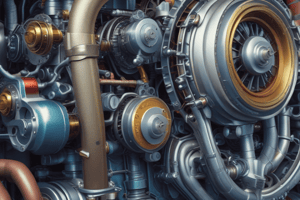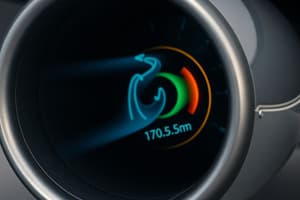Podcast
Questions and Answers
What happens when engine temperatures are excessively high?
What happens when engine temperatures are excessively high?
Cause loss of power, excessive oil consumption, and possible permanent internal engine damage.
What may indicate that the pilot has been operating with too much power?
What may indicate that the pilot has been operating with too much power?
Engine oil temperature and cylinder head temperature gauges exceeding their normal operating range.
Which would most likely cause the cylinder head temperature and engine oil temperature gauges to exceed their normal operating ranges?
Which would most likely cause the cylinder head temperature and engine oil temperature gauges to exceed their normal operating ranges?
- High humidity levels.
- Excessive engine power.
- Using fuel that has a lower-than specified fuel rating. (correct)
- Operating at low altitudes.
What are internal cooling reciprocating aircraft engines especially dependent on?
What are internal cooling reciprocating aircraft engines especially dependent on?
What might cause an abnormally high engine oil temperature indication?
What might cause an abnormally high engine oil temperature indication?
What action can a pilot take to aid in cooling an engine that is overheating during a climb?
What action can a pilot take to aid in cooling an engine that is overheating during a climb?
What procedures can aid in cooling an overheated engine?
What procedures can aid in cooling an overheated engine?
What does VS0 represent?
What does VS0 represent?
What does VFE stand for?
What does VFE stand for?
What does VS1 indicate?
What does VS1 indicate?
What is VNO?
What is VNO?
What does VNE represent?
What does VNE represent?
What is the VLE speed?
What is the VLE speed?
What does VA stand for?
What does VA stand for?
What is VY?
What is VY?
What does VX represent?
What does VX represent?
Which V-speed represents maneuvering speed?
Which V-speed represents maneuvering speed?
What does the red line on an airspeed indicator signify?
What does the red line on an airspeed indicator signify?
Which color identifies the never-exceed speed?
Which color identifies the never-exceed speed?
Which color identifies the power-off stalling speed in a specified configuration?
Which color identifies the power-off stalling speed in a specified configuration?
Which V-speed provides the greatest altitude gain in the shortest distance during climb after takeoff?
Which V-speed provides the greatest altitude gain in the shortest distance during climb after takeoff?
After takeoff, which airspeed is used to gain the most altitude in a given period of time?
After takeoff, which airspeed is used to gain the most altitude in a given period of time?
What is an important airspeed limitation that is not color-coded on airspeed indicators?
What is an important airspeed limitation that is not color-coded on airspeed indicators?
Which V-speed represents maximum flap extended speed?
Which V-speed represents maximum flap extended speed?
Which V-speed represents maximum landing gear extended speed?
Which V-speed represents maximum landing gear extended speed?
What is VNO defined as?
What is VNO defined as?
What is VS0 defined as?
What is VS0 defined as?
Flashcards are hidden until you start studying
Study Notes
Engine Temperature and Operation
- Excessively high engine temperatures can lead to loss of power, increased oil consumption, and potential permanent engine damage.
- Elevated engine oil and cylinder head temperatures indicate possible operation with too much power and a lean fuel mixture.
- Using fuel with a lower-than-specified rating can cause high cylinder head and engine oil temperature readings.
- Adequate lubrication oil circulation is crucial for internal cooling in reciprocating engines.
- Low oil levels can result in abnormally high engine oil temperature.
Cooling Procedures for Overheating Engines
- To cool an overheating engine during climb, a pilot should reduce the rate of climb and increase airspeed.
- Techniques to cool an overheating engine include enriching the mixture, opening cowl flaps, increasing airspeed, and reducing power.
V-Speeds Overview
- VS0: Stall speed or minimum steady flight speed in landing configuration, indicated by the lower limit of the white arc.
- VFE: Maximum flap extended speed, marked by the upper limit of the white arc.
- VS1: Stall speed or minimum steady flight speed in a specified configuration, indicated by the lower limit of the green arc.
- VNO: Maximum structural cruising speed, defined by the upper limit of the green arc and lower limit of the yellow arc.
- VNE: Never exceed speed, marked in red and represents the upper limit of the yellow arc.
- VLE: Maximum landing gear extended speed.
- VA: Design maneuvering speed; recommended speed in turbulent conditions to minimize structural stress.
- VY: Best rate-of-climb speed, maximizing altitude within a given time.
- VX: Best angle-of-climb speed, maximizing altitude in a given distance.
Specific V-Speed Characteristics
- VA is the speed representing maneuvering capability under turbulence.
- The red line on the airspeed indicator marks the VNE, or never-exceed speed.
- The red radial line specifically identifies the never-exceed speed for pilots.
- The lower limit of the green arc indicates the power-off stalling speed in a specified configuration.
- VX provides the greatest altitude gain in the shortest distance after takeoff.
- VY is used to achieve the most altitude in the shortest time following takeoff.
- Maneuvering speed is an important airspeed limitation that lacks color coding on indicators.
- VFE corresponds to the maximum flap extended speed, while VLE refers to the maximum speed with landing gear extended.
- VNO is defined as the maximum structural cruising speed.
- VS0 is specifically the stall speed for the landing configuration of the aircraft.
Studying That Suits You
Use AI to generate personalized quizzes and flashcards to suit your learning preferences.




